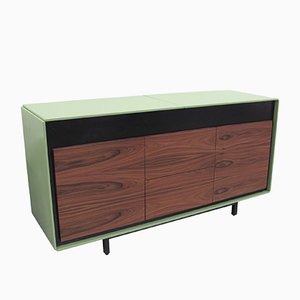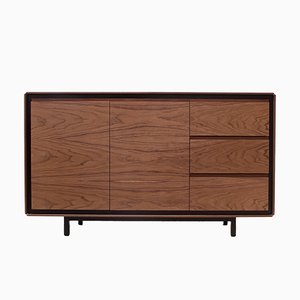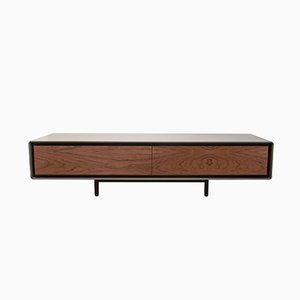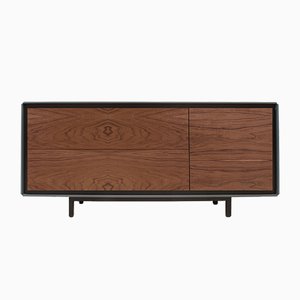Woodworking is a multi-generational tradition for Porto-based Piurra
Wood and Roots
The son of a carpenter and grandson of a master woodcarver, designer Rui Viana inspired investors to launch Piurra in 2007 with a handful of lovely and lofty goals: employ skillful, small-batch production techniques rooted in the Portuguese woodworking tradition; work only with craftsmen and suppliers within about 20 kilometers of Porto; and create products to be passed down to the next generation. Today, Piurra specializes in handmade-to-order wood casegoods—sideboards, consoles, desks, and the like—and can be counted among the growing number of conscientious studio-makers driving the current buzz around contemporary Portuguese design.
Always supportive of design businesses that aim to do good, we reached out to Viana to learn more about how Piurra keeps it local while selling to clients around the world. Here’s what he had to say:
P: What is Piurra all about?
RV: Piurra is founded on values that go beyond the formal aspects of design. We are committed to manufacturing in our small town and supporting small companies that would otherwise disappear—local to global. Our designs have a certain “vintage” quality, because we want to resonate with the images, shapes, and textures that people recall from their lives, from their families. Perhaps we can awaken dormant but comforting memories. In our Carpet Collection V1.0, for instance, we use classic Portuguese handmade carpets on the surface of the wood; in Pinhole Collection, we incorporate a perforated material that was very commonly used in 1970s interiors.
P: What’s more important to you: tradition or trends?
RV: We always seek a balance between the two, of course. But when we talk about tradition, we talk about the people who are involved and the know-how they bring to our production. This knowledge materializes in the details. And it's these details that make all the difference.
P: When you are designing and making, what sort of client do you have in mind?
RV: Our clientele is demanding and curious. We try to attract people's attention through simplicity and aim to reach those who are interested in things that are both well designed and well crafted.
P: What do you love most about your work?
RV: I love that there are two phases in the design process: first, the creative phase, or the reflection phase, when I’m alone inside my studio; and then the prototyping and production phase, when the team comes together to be objective, technical, and collaborative. Even though these kinds of work often overlap and mix, both are needed to get to the right result.
P: Where do you find your inspiration?
RV: For sure, the fact that my ancestors had a connection with wood brings me a lot of inspiration—the stories I keep hearing about my grandfather most especially. I try to bring his sense of simplicity and honesty to my drawings. I also take a lot from my favorite music and movies; certain images and sounds unconsciously influence me in the drawing process. For example, the minimalism of a Kraftwerk song or the mysteriousness of a David Lynch scene, where it’s all about subtle details and not showing the obvious. World music, too, means a lot to me; it inspires me to understand and preserve the traditions and roots behind my own work.
P: What would be your ideal project?
RV: My ideal, which I work toward everyday, is to create timeless, emotionally valuable objects that can be used by more than one generation.
P: Where do you hope to be in five, ten, twenty years?
RV: Piurra is a Portuguese word for a sort of a spinning top. A piurra swirls in several directions and, from time to time, we need to throw it again. With each throw, we change something to make it better, to make it last longer. In the next few years, we want to grow enough so that we can keep improving our designs, production practices, and environmental impact, always with the aspiration to lengthen the lifetime of our products.




